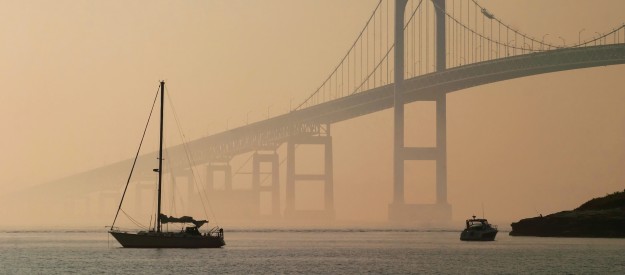"We are losing our attitude of wonder, of contemplation, of listening to creation and thus we no longer manage to interpret within it what Benedict XVI calls 'the rhythm of the love-story between God and man.'"
+ Pope Francis
Bridging faith, hope, and love in the Ocean State

Two politicians and a sociology professor walk into a church. No, seriously. Thanks to Rhode Island Interfaith Power and Light, a sitting U.S. senator known for his bold stance on climate change, a state legislator that led the charge for groundbreaking climate legislation, and a renowned sociology and environmental studies researcher joined forces to encourage action in a time that desperately needs it.
“Interfaith Action on Climate Change,” held Wednesday at the Gloria Dei Lutheran Church in Providence, did more than disseminate information and encourage networking. It demonstrated the unitive nature of protecting nature.
Dozens of citizens from various faith communities and a wide array of ages, backgrounds, and professional affiliations had for that morning one common interest: working together to respond to the causes and effects of climate change on their beloved Ocean State—which has as its state motto the simple word “Hope.”
Senator Sheldon Whitehouse (D-RI) spoke with his usual eloquence and force about the science and politics of climate change. He graciously noted the difficulty of many of his colleagues of the opposite party. Many Republicans, he said, were afraid to come out in support of climate-change legislation because of “powerful interests” that seek to obfuscate the matter.
This was a helpful contribution. While some climate-change activists often demonize such Republicans, Whitehouse spoke of them with sympathy—well, frequently with sympathy—as he portrayed a political climate that was ripe for conservatives to return to their conservation roots.
Still, while Whitehouse has been busy on the Senate floor and elsewhere to sound the climate alarm, he said that help was needed from everyday folks—like the ones sitting before him at Gloria Dei church.
Later, State Representative Arthur Handy spoke from a position of victory. A climate bill he had sponsored seemed to have little chance of passing in January. But it did pass— and the law is already responsible for astounding strides in how Rhode Island is responding to, and seeking to mitigate in some small way, climate change.
Handy spoke of his “great fear” given what science is saying. But he also acknowledged “great hope” given the increase he’s seen in activity in his adopted state of Rhode Island—as well as nationally and internationally.
Speaking between the two politicians was Dr. Timmons Roberts, Ittleson Professor of Environmental Studies, Professor of Sociology at Brown University. I’ve gotten to know Timmons (as he’s called around here) thanks to my involvement in climate change at work and with efforts like those of Rhode Island Interfaith Power and Light (I am the past president). I am continually grateful that my home state benefits from an academic who gets the human element, which is probably why he has been so successful at “prodding” (his words) local officials over the years to move on climate change and natural hazard response planning.
Dr. Robert’s tenacity has paid off with the formation of a legislative climate commission a few years back. He was also instrumental in helping pass Representative Handy’s climate bill this year. There's much else he's done, and in all of it he can be found focusing on the least of these, as Christ called them. That is, the voiceless, the forgotten, the poorest of the poor.
Case in point: in 2011, a year after devastating floods in Rhode Island, Timmons and his students spoke with people who had their homes flooded—many of whom were just a few block from where I live. A focus of this academic exercise was to look at how natural hazards impact the poor disproportionately. One touching element of the study was its calling attention to how the elderly poor often lose a lifetime of memorabilia in floods—all those pictures and letters that are often "kept safe" in a basement.
I was struck back then when these Ivy League academicians and students focused on what may seem trivial but what is indeed quite central to human dignity—the memories of who we were and those we loved. And sure enough, in his talk on Wednesday Dr. Roberts called this detail to the attention to those gathered at the RI IPL gathering.
Of course Dr. Roberts is concerned about bigger ticket issues—like “adaptive apartheid,” which come from the ability of the wealthy to protect their lives and interests while the poor cannot. He spoke rather pastorally about such human impacts, which was appropriate given that the decorative draping on the event's podium depicted the Holy Trinity—the God who is relation and love.
And after all, as the drama of studying and responding to climate change unfolds it will be relationships and love that will be necessary to keep politics and science on course; to build up and protect the common good; and to bridge the ideological divides that must be bridged to better protect the plant and its peoples, especially those who need our attention the most.
Kudos to RI IPL’s president, Rev. Dr. Anita Schell, Rector of Emmanuel Episcopal Church. Her leadership has been a gift. And the organization’s executive director Kathy Black deserves a loud round of applause for her behind-the-scenes heavy lifting and exceptional emceeing. Indeed, all those on the RI IPL board and its many volunteers are to be commended for their continued efforts to join together faith, reason, church, and state—all for helping people by stewarding the great goodness of God’s life-giving planet Earth.


















